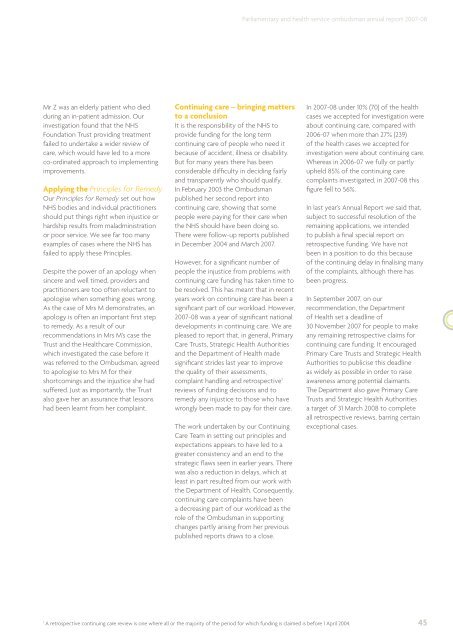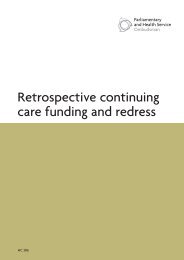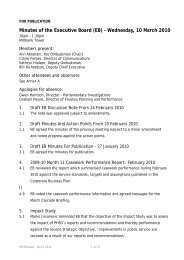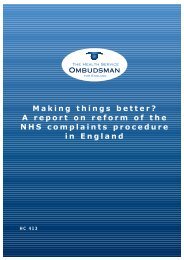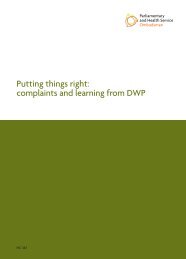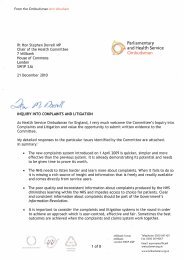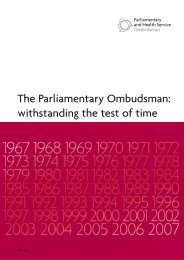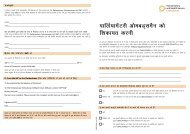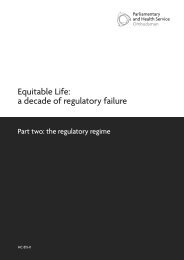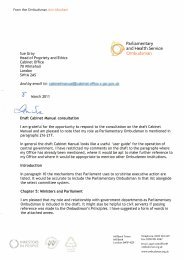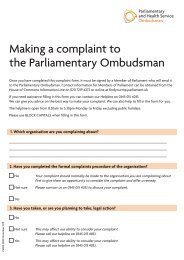Annual Report 2007-08 - the Parliamentary and Health Service ...
Annual Report 2007-08 - the Parliamentary and Health Service ...
Annual Report 2007-08 - the Parliamentary and Health Service ...
- No tags were found...
You also want an ePaper? Increase the reach of your titles
YUMPU automatically turns print PDFs into web optimized ePapers that Google loves.
<strong>Parliamentary</strong> <strong>and</strong> health service ombudsman annual report <strong>2007</strong>-<strong>08</strong>Mr Z was an elderly patient who diedduring an in-patient admission. Ourinvestigation found that <strong>the</strong> NHSFoundation Trust providing treatmentfailed to undertake a wider review ofcare, which would have led to a moreco-ordinated approach to implementingimprovements.Applying <strong>the</strong> Principles for RemedyOur Principles for Remedy set out howNHS bodies <strong>and</strong> individual practitionersshould put things right when injustice orhardship results from maladministrationor poor service. We see far too manyexamples of cases where <strong>the</strong> NHS hasfailed to apply <strong>the</strong>se Principles.Despite <strong>the</strong> power of an apology whensincere <strong>and</strong> well timed, providers <strong>and</strong>practitioners are too often reluctant toapologise when something goes wrong.As <strong>the</strong> case of Mrs M demonstrates, anapology is often an important first stepto remedy. As a result of ourrecommendations in Mrs M’s case <strong>the</strong>Trust <strong>and</strong> <strong>the</strong> <strong>Health</strong>care Commission,which investigated <strong>the</strong> case before itwas referred to <strong>the</strong> Ombudsman, agreedto apologise to Mrs M for <strong>the</strong>irshortcomings <strong>and</strong> <strong>the</strong> injustice she hadsuffered. Just as importantly, <strong>the</strong> Trustalso gave her an assurance that lessonshad been learnt from her complaint.Continuing care – bringing mattersto a conclusionIt is <strong>the</strong> responsibility of <strong>the</strong> NHS toprovide funding for <strong>the</strong> long termcontinuing care of people who need itbecause of accident, illness or disability.But for many years <strong>the</strong>re has beenconsiderable difficulty in deciding fairly<strong>and</strong> transparently who should qualify.In February 2003 <strong>the</strong> Ombudsmanpublished her second report intocontinuing care, showing that somepeople were paying for <strong>the</strong>ir care when<strong>the</strong> NHS should have been doing so.There were follow-up reports publishedin December 2004 <strong>and</strong> March <strong>2007</strong>.However, for a significant number ofpeople <strong>the</strong> injustice from problems withcontinuing care funding has taken time tobe resolved. This has meant that in recentyears work on continuing care has been asignificant part of our workload. However,<strong>2007</strong>-<strong>08</strong> was a year of significant nationaldevelopments in continuing care. We arepleased to report that, in general, PrimaryCare Trusts, Strategic <strong>Health</strong> Authorities<strong>and</strong> <strong>the</strong> Department of <strong>Health</strong> madesignificant strides last year to improve<strong>the</strong> quality of <strong>the</strong>ir assessments,complaint h<strong>and</strong>ling <strong>and</strong> retrospective 1reviews of funding decisions <strong>and</strong> toremedy any injustice to those who havewrongly been made to pay for <strong>the</strong>ir care.The work undertaken by our ContinuingCare Team in setting out principles <strong>and</strong>expectations appears to have led to agreater consistency <strong>and</strong> an end to <strong>the</strong>strategic flaws seen in earlier years. Therewas also a reduction in delays, which atleast in part resulted from our work with<strong>the</strong> Department of <strong>Health</strong>. Consequently,continuing care complaints have beena decreasing part of our workload as <strong>the</strong>role of <strong>the</strong> Ombudsman in supportingchanges partly arising from her previouspublished reports draws to a close.In <strong>2007</strong>-<strong>08</strong> under 10% (70) of <strong>the</strong> healthcases we accepted for investigation wereabout continuing care, compared with2006-07 when more than 27% (239)of <strong>the</strong> health cases we accepted forinvestigation were about continuing care.Whereas in 2006-07 we fully or partlyupheld 85% of <strong>the</strong> continuing carecomplaints investigated, in <strong>2007</strong>-<strong>08</strong> thisfigure fell to 56%.In last year’s <strong>Annual</strong> <strong>Report</strong> we said that,subject to successful resolution of <strong>the</strong>remaining applications, we intendedto publish a final special report onretrospective funding. We have notbeen in a position to do this becauseof <strong>the</strong> continuing delay in finalising manyof <strong>the</strong> complaints, although <strong>the</strong>re hasbeen progress.In September <strong>2007</strong>, on ourrecommendation, <strong>the</strong> Departmentof <strong>Health</strong> set a deadline of30 November <strong>2007</strong> for people to makeany remaining retrospective claims forcontinuing care funding. It encouragedPrimary Care Trusts <strong>and</strong> Strategic <strong>Health</strong>Authorities to publicise this deadlineas widely as possible in order to raiseawareness among potential claimants.The Department also gave Primary CareTrusts <strong>and</strong> Strategic <strong>Health</strong> Authoritiesa target of 31 March 20<strong>08</strong> to completeall retrospective reviews, barring certainexceptional cases.1A retrospective continuing care review is one where all or <strong>the</strong> majority of <strong>the</strong> period for which funding is claimed is before 1 April 2004. 45


